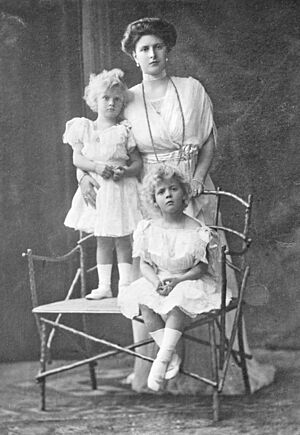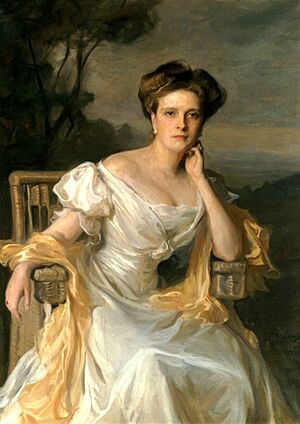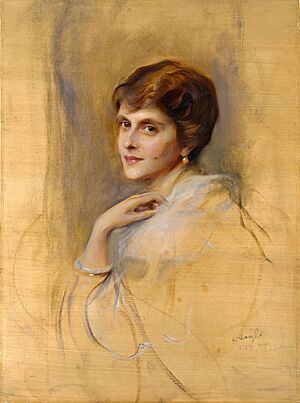Princess Alice of Battenberg facts for kids
Quick facts for kids Alice of Battenberg |
|||||
|---|---|---|---|---|---|
| Princess Andrew of Greece and Denmark | |||||
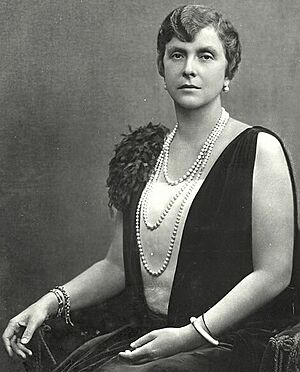
Photograph, c. 1920
|
|||||
| Born | 25 February 1885 Windsor Castle, Berkshire, United Kingdom |
||||
| Died | 5 December 1969 (aged 84) Buckingham Palace, London, United Kingdom |
||||
| Burial | 10 December 1969 St George's Chapel, Windsor Castle 3 August 1988 Church of Mary Magdalene, Gethsemane, Jerusalem |
||||
| Spouse | |||||
| Issue |
|
||||
|
|||||
| House | Battenberg | ||||
| Father | Louis Mountbatten, 1st Marquess of Milford Haven | ||||
| Mother | Princess Victoria of Hesse and by Rhine | ||||
| Religion |
|
||||
| Signature |  |
||||
Princess Alice of Battenberg (born Victoria Alice Elizabeth Julia Marie; February 25, 1885 – December 5, 1969) was a very important royal. She was the mother of Prince Philip, Duke of Edinburgh. This means she was the mother-in-law of Queen Elizabeth II and the grandmother of King Charles III. In 1903, she married Prince Andrew of Greece and Denmark. After her marriage, she became known as Princess Andrew of Greece and Denmark.
Princess Alice was a great-granddaughter of Queen Victoria. She was born at Windsor Castle in the United Kingdom. She grew up in the UK, Germany, and Malta. She was born a princess of Hesse. She was part of the Battenberg family, a branch of the House of Hesse-Darmstadt. Princess Alice was born deaf.
She lived in Greece until the royal family had to leave in 1917. When she returned to Greece, her husband was partly blamed for Greece's defeat in a war. The family was forced to leave Greece again. They could only return after the Greek monarchy was restored in 1935.
In 1930, Princess Andrew became very ill and was cared for in a special hospital in Switzerland. She lived separately from her husband after this. When she recovered, she spent most of her life helping others in Greece. She stayed in Athens during World War II. She bravely hid Jewish refugees from danger. Because of this, Israel's Holocaust memorial, Yad Vashem, honored her as "Righteous Among the Nations".
After the war, she stayed in Greece. She started a group of nuns called the Christian Sisterhood of Martha and Mary. This group helped people in need. In 1967, the King of Greece was removed from power. Princess Andrew was invited by her son and daughter-in-law to live at Buckingham Palace in London. She passed away there two years later. In 1988, her remains were moved from Windsor Castle to the Church of Mary Magdalene in Jerusalem. This was her final resting place.
Contents
Early Life and Royal Connections
Princess Alice was born on February 25, 1885. She was born in the Tapestry Room at Windsor Castle. Her great-grandmother, Queen Victoria, was there for her birth. Alice was the oldest child of Prince Louis of Battenberg and Princess Victoria of Hesse and by Rhine. Her mother was the daughter of Louis IV, Grand Duke of Hesse, and Princess Alice of the United Kingdom. Princess Alice of the United Kingdom was Queen Victoria's second daughter.
Her father was the son of Prince Alexander of Hesse and by Rhine. His marriage was not considered equal to a royal marriage. His wife, Julia Hauke, was made Princess of Battenberg in 1858. Alice had three younger siblings: Louise, George, and Louis. They later became the Queen of Sweden, a Marquess, and an Earl.
Christening and Childhood
Alice was christened Victoria Alice Elizabeth Julia Marie. This happened in Darmstadt, Germany, on April 25, 1885. She had six godparents, including her grandparents and her great-grandmother Queen Victoria.
Alice spent her childhood in different places. These included Darmstadt, London, Jugenheim, and Malta. Her father was a naval officer, so he was sometimes stationed in Malta. Her mother noticed that Alice was slow to learn to talk. Her speech was also unclear. Her grandmother, the Princess of Battenberg, realized the problem. She took Alice to an ear specialist. Alice was then diagnosed with congenital deafness, meaning she was born deaf.
With her mother's help, Alice learned to read lips and speak. She learned to speak in both English and German. She was taught at home. She also learned French. Later, when she got engaged, she learned Greek. She spent her early years with her royal relatives. She was a bridesmaid at the wedding of King George V and Queen Mary in 1893. Just before her 16th birthday, she attended Queen Victoria's funeral. Soon after, she was confirmed in the Anglican faith.
Marriage and Family Life
Princess Alice met Prince Andrew of Greece and Denmark in London. He was the fourth son of King George I of Greece. They met during King Edward VII's coronation in 1902. They had a civil wedding on October 6, 1903, in Darmstadt. The next day, they had two religious ceremonies. One was Lutheran, and the other was Greek Orthodox. After her marriage, she became "Princess Andrew".
The bride and groom were related to many royal families. These included the families of the United Kingdom, Germany, Russia, Denmark, and Greece. Their wedding was a big gathering of royal relatives before World War I. Prince and Princess Andrew had five children: Margarita, Theodora, Cecilie, Sophie, and Philip.
After their wedding, Prince Andrew continued his military career. Princess Andrew started doing charity work. In 1908, she visited Russia. She talked with her aunt, Grand Duchess Elizabeth Feodorovna. Her aunt was planning to start a religious group of nurses. Princess Andrew attended the start of her aunt's new church. Later that year, her aunt gave away her belongings to live a more spiritual life.
When Prince and Princess Andrew returned to Greece, the political situation was getting worse. The government in Athens did not support the Cretan parliament. This parliament wanted Crete to join Greece. A group of unhappy officers formed a military league. This led to Prince Andrew leaving the army. It also led to Eleftherios Venizelos gaining power.
Challenges and Changes
When the Balkan Wars began, Prince Andrew rejoined the army. Princess Andrew worked as a nurse. She helped with operations and set up field hospitals. For her efforts, King George V gave her the Royal Red Cross in 1913. During World War I, her brother-in-law, King Constantine I of Greece, tried to keep Greece neutral. However, the elected government supported the Allies.
Princess Andrew and her children had to hide in the palace cellars. This was during the French bombing of Athens in December 1916. By June 1917, the King's neutrality policy was not working. She and other members of the Greek royal family were forced to leave Greece. They lived in Switzerland for several years.
Royal Families Face Changes
The global war changed the power of Europe's royal families. Princess Andrew's father, Prince Louis of Battenberg, lost his naval career. This was because of strong anti-German feelings in Britain. In 1917, he gave up his German title and changed his family name to Mountbatten. The King then made him Marquess of Milford Haven.
The next year, two of Princess Andrew's aunts were killed by Bolsheviks after the Russian Revolution. These were Empress Alexandra Feodorovna and Grand Duchess Elizabeth Feodorovna. After the war, the Russian, German, and Austro-Hungarian empires fell. Princess Andrew's uncle, Ernest Louis, Grand Duke of Hesse, also lost his position.
In 1920, King Constantine returned to Greece. Prince and Princess Andrew also briefly returned. They lived on Corfu at Mon Repos. Prince Andrew had inherited this home in 1913. But after Greece lost the Greco-Turkish War (1919–1922), a new group took power. They forced King Constantine to leave Greece again.
Prince Andrew, who had been a military commander, was arrested. Other former ministers and generals were executed after quick trials. British diplomats worried that Prince Andrew was also in danger. After a quick trial, he was ordered to leave the country. Prince and Princess Andrew and their children fled Greece on a British ship.
Illness and Recovery
The family settled in a small house near Paris. It was loaned to them by Princess George of Greece and Denmark. Princess Andrew helped at a charity shop for Greek refugees. She became very religious. In October 1928, she joined the Greek Orthodox Church. That winter, she translated her husband's explanation of his actions during the war into English. Soon after, she began to believe she was receiving messages from God and had healing powers.
In 1930, her behavior became very unusual. She said she was talking to the Buddha and Christ. Doctors diagnosed her with a serious mental health condition. She was taken away from her family and placed in a special hospital in Switzerland. This hospital was well-known and had other famous patients. She believed she was well and tried many times to leave the hospital.
During Princess Andrew's long recovery, she and Prince Andrew grew apart. Her daughters all married German princes in 1930 and 1931. She did not attend any of their weddings. Prince Philip went to the United Kingdom. He stayed with his uncles and grandmother.
Princess Andrew stayed at the hospital for two years. After a short stay at another clinic, she was released. She then traveled around Central Europe, often without telling people who she was. She kept in touch with her mother. But she did not contact the rest of her family until late 1936. In 1937, her daughter Cecilie, her son-in-law, and two grandchildren died in a plane crash. She and Prince Andrew met for the first time in six years at the funeral. Prince Philip also attended. She began to connect with her family again. In 1938, she returned to Athens alone. She lived in a small apartment and worked to help the poor.
World War II and Heroism
During World War II, Princess Andrew was in a difficult situation. Her sons-in-law fought for Germany. Her son, Philip, was in the British Royal Navy. Her cousin was the German ambassador in Greece until German forces took over Athens in April 1941. She and her sister-in-law, Princess Nicholas of Greece, stayed in Athens throughout the war. Most of the Greek royal family were in exile in South Africa.
She moved into her brother-in-law George's house in Athens. She worked for the Red Cross. She helped organize soup kitchens for people who were starving. She even flew to Sweden to bring back medical supplies. She said she was visiting her sister, Crown Princess Louise. She also set up two shelters for orphaned children. She created a nursing service for poor areas.
The German forces thought Princess Andrew was on their side. This was because one of her sons-in-law was a member of the Nazi party. Another had been injured fighting for Germany. However, when a German general asked if he could do anything for her, she replied, "You can take your troops out of my country."
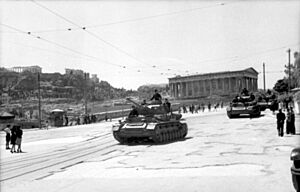
After the Italian leader Benito Mussolini fell from power in September 1943, the German Army occupied Athens. Many Greek Jews had sought safety there. Most of them were sent to Nazi concentration camps, where nearly all died. During this time, Princess Andrew bravely hid Rachel Cohen, a Jewish widow, and two of her children. They were trying to escape the Gestapo and being sent to the death camps.
In 1913, Rachel's husband had helped King George I of Greece. The King had promised to help him if he ever needed it. Years later, Rachel's son remembered this promise. He asked Princess Andrew for help. She was one of only two royal family members left in Greece. Princess Andrew honored the promise and saved the Cohen family.
When Athens was freed in October 1944, a British official visited Princess Andrew. He described her as "living in humble, not to say somewhat squalid conditions". She wrote to her son that in the week before liberation, she only had bread and butter to eat. She had not eaten meat for several months.
By early December, the situation in Athens was still bad. Communist fighters were fighting the British for control of the capital. During this fighting, Princess Andrew learned that her husband had died. They had not seen each other since 1939. During the fighting, she insisted on walking the streets. She gave food to police officers and children, even though there was a curfew. When warned she might be shot, she said, "they tell me that you don't hear the shot that kills you and in any case I am deaf. So, why worry about that?"
Later Life and Legacy
Princess Andrew returned to the United Kingdom in April 1947. She attended the November wedding of her only son, Philip. He married Princess Elizabeth, the daughter of King George VI. She used some of her remaining jewels for Princess Elizabeth's engagement ring. On the wedding day, her son was made Duke of Edinburgh. Princess Andrew's daughters were not invited to the wedding. This was because of strong anti-German feelings in Britain after World War II.
In January 1949, the princess started a group of Greek Orthodox nuns. It was called the Christian Sisterhood of Martha and Mary. She trained on the Greek island of Tinos. She set up a home for the group near Athens. She traveled to the United States in 1950 and 1952 to raise money. Her mother was surprised by her actions, saying, "What can you say of a nun who smokes and plays canasta?"
Princess Andrew's daughter-in-law became Queen in 1952. The princess attended the new Queen's coronation in June 1953. She wore a grey dress and wimple, like a nun's habit. However, her nursing order eventually failed because not enough people joined.
In 1960, she visited India. She was invited by Rajkumari Amrit Kaur, who was impressed by Princess Andrew's interest in Indian religious ideas. The trip ended early when she became ill. She later said she had an out-of-body experience.
Princess Andrew became increasingly deaf and frail. She left Greece for the last time after a military takeover in 1967. Queen Elizabeth II and Prince Philip invited Princess Andrew to live permanently at Buckingham Palace in London. The King of Greece and his wife went into exile that December.
Death and Final Resting Place
Princess Andrew remained clear-minded but physically weak. She passed away at Buckingham Palace on December 5, 1969. She had given away all her possessions. Her remains were first placed in the Royal Crypt at St George's Chapel at Windsor Castle. But before she died, she had wished to be buried at the Church of Mary Magdalene in Gethsemane in Jerusalem. This was near her aunt, Grand Duchess Elizabeth Feodorovna. When her daughter worried it would be too far to visit, Princess Andrew joked, "Nonsense, there's a perfectly good bus service!" Her wish came true on August 3, 1988. Her remains were moved to her final resting place below the church.
On October 31, 1994, Princess Andrew's two surviving children, the Duke of Edinburgh and Princess George of Hanover, went to Yad Vashem in Jerusalem. This was a ceremony honoring her as "Righteous Among the Nations". This was for hiding the Cohen family in her home during World War II. Prince Philip said about his mother helping Jewish people, "I suspect that it never occurred to her that her action was in any way special. She was a person with a deep religious faith, and she would have considered it to be a perfectly natural human reaction to fellow beings in distress." In 2010, the British Government also honored her as a Hero of the Holocaust.
Titles and Honors
Titles and Styles
- February 25, 1885 – October 6, 1903: Her Serene Highness Princess Alice of Battenberg
- October 6, 1903 – December 5, 1969: Her Royal Highness Princess Andrew of Greece and Denmark
- From 1949 until her death, she was sometimes called Mother Superior Alice-Elizabeth.
Honors and Awards
 Dame of the Order of the Golden Lion, October 7, 1903
Dame of the Order of the Golden Lion, October 7, 1903 Dame Grand Cross of the Order of Saints Olga and Sophia
Dame Grand Cross of the Order of Saints Olga and Sophia Royal Red Cross, 1913
Royal Red Cross, 1913 Dame of the Order of Queen Maria Luisa, April 9, 1928
Dame of the Order of Queen Maria Luisa, April 9, 1928
Honors Given After Her Death:
 Righteous Among the Nations, 1993
Righteous Among the Nations, 1993 British Hero of the Holocaust, 2010
British Hero of the Holocaust, 2010
Her Children
| Name | Birth | Death | Marriage | Their children | |
|---|---|---|---|---|---|
| Date | Spouse | ||||
| Princess Margarita | April 18, 1905 | April 24, 1981 (aged 76) | April 20, 1931 Widowed May 11, 1960 |
Gottfried, Prince of Hohenlohe-Langenburg |
|
| Princess Theodora | May 30, 1906 | October 16, 1969 (aged 63) | August 17, 1931 Widowed October 27, 1963 |
Berthold, Margrave of Baden |
|
| Princess Cecilie | June 22, 1911 | November 16, 1937 (aged 26) | February 2, 1931 | Georg Donatus, Hereditary Grand Duke of Hesse |
|
| Princess Sophie | June 26, 1914 | November 24, 2001 (aged 87) | December 15, 1930 Widowed October 7, 1943 |
Prince Christoph of Hesse |
|
| April 23, 1946 | Prince George William of Hanover |
|
|||
| Prince Philip, Duke of Edinburgh | June 10, 1921 | April 9, 2021 (aged 99) | November 20, 1947 | Elizabeth II, Queen of the United Kingdom |
|
 | Leon Lynch |
 | Milton P. Webster |
 | Ferdinand Smith |


